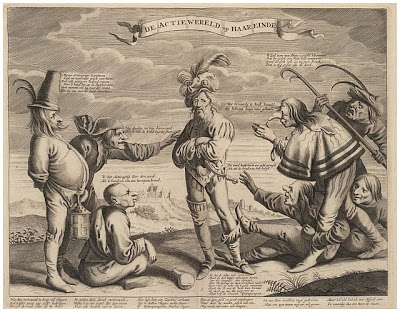Onderzoek Universiteit Graz: stop Google
14 december 2007
Biomedbiblog attendeerde mij op een interessant rapport van de Universiteit van Graz: Report on dangers and opportunities posed by large search engines, particularly Google (PDF)
Op Business Spectator vind je meer achtergrondinformatie over het rapport.
Uit de samenvatting van het rapport:
For everyone looking at the situation it must be clear that Google has amassed power in an
unprecedented way that is endangering our society. Here is a brief summary:Google as search engine is dominating (Convincing evidence on this is easily available and presented in Section 1). That on its own is dangerous, but could possibly be accepted as “there is no real way out”, although this is not true, either. (We would rather see a number of big search engines run by some official non-profit organisations than a single one run by a private, profit driven company.) However, in conjunction with the fact that Google is operating many other services, and probably silently cooperating with still further players, this is unacceptable.
The reasons are basically:
– Google is massively invading privacy. It knows more than any other organisation about people, companies and organisations than any institution in history before, and is not restricted by national data protection laws.
– Thus, Google has turned into the largest and most powerful detective agency the world has ever known. I do not contend that Google has started to use this potential, but as commercial company it is FORCED to use this potential in the future, if it promises big revenue. If government x or company y is requesting support from Google for information on whatever for a large sum, Google will have to comply or else is violating its responsibilities towards its stockholders.
– Google is influencing economy by the way advertisements are ranked right now: the more a company pays, the more often will the add be visible. Google answers that result from queries are also already ranked when searches are conducted (we give strong evidence for this in Section 1): Indeed we believe it cannot avoid ranking companies higher in the future who pay for such improved ranking: Google is responsible to stockholders to increase the company’s value. Google is of course doing this already for ads.
– Since most material that is written today is based on Google and Wikipedia, if those two do not reflect reality, the picture we are getting through “googeling reality” as Stephan Weber calls it, is not reality, but the Google-Wikipedia version of reality. There are strong indications that Google and Wikipedia cooperate: some sample statistics show that random selected entries in Wikipedia are consistently rated higher in Google than in other search engines.
– That biased contributions can be slipped into Wikipedia if enough money is invested is well established.
– Google can use its almost universal knowledge of what is happening in the world to play the stock market without risk: in certain areas Google KNOWS what will happen, and does not have to rely on educated guesses as other players in stock market have to. This is endangering trading on markets: by game theory, trading is based on the fact that nobody has complete information (i.e. will win sometimes, but also loose sometimes). Any entity that never looses rattles the basic foundations of stock exchanges!
– It has to be recognized that Google is not an isolated phenomenon: no society can leave certain basic services (elementary schooling, basic traffic infrastructure, rules on admission of medication,… ) to the free market. It has to be recognized that Internet and the WWW also need such regulations, and if international regulations that are strong enough cannot be passed, then as only saving step an anti-Trust suite against Google has to be initiated, splitting the giant in still large companies, each able so survive, but with strict “walls” between them.
– It has to be recognized that Google is very secretive about how it ranks, how it collects data and what other plans it has. It is clear from actions in the past (as will be discussed in this report) that Google could dominate the plagiarism detection and IPR violation detection market, but chooses not to do so. It is clear that it has strong commercial reasons to act as it does.
– Google’s open aim is to “know everything there is to know on Earth”. It cannot be tolerated that a private company has that much power: it can extort, control, and dominate the world at will.
I thus call for immediate action, and some possibilities are spelt out in this report.
Straffe uitspraken, maar ze sluiten naadloos aan op de boodschap van Freespeech: ‘het web is van ons, niet van hen’.
@
Afbeelding via.
er zit een foutje in je url voor het rapport
Oeps!
Bedankt voor het doorgeven Aad, ik het het aangepast!
Edwin
Eehhh….
waarom zie ik nog een google search toestand op je site…..
Scherp Ano!
Dat is vooral omdat die zoekfunctionaliteit wel goed werkt.
Als ik me er geheel aan zou moeten houden zou ik ook niet met blogger en gmail moeten werken, niet met google docs en youtube, niet met maps en google books, niet met Earth en Blogsearch, niet….
Ook ik, Brutus :-/
@ ed
dank voor de link naar het rapport en de omschrijving!
@ ano en ed alias brutus,
het feit dat je een dienst gebruikt betekent nog niet dat je d’r geen kritische kanttekeningen bij mag plaatsen, gelukkig! “It’s not how far you fall, it’s the way you land” 🙂
@ Marina:
Graag gedaan! En dat van dat landen is wel een aardige 🙂